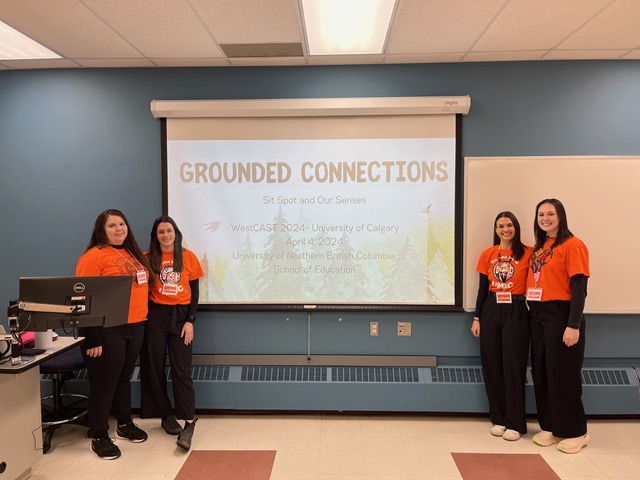“Educators contribute to the profession.”
Educators sharing insights and experiences with colleagues fosters a collaborative environment, enriching teaching practices and promoting innovation in the classroom. Educators can see a different point of view and even question those around them for professional discussions. By presenting their work or research, teachers not only showcase their expertise but also inspire others to explore new approaches that they may try in their own classrooms. Investing in their professional growth and contributing to the broader educational community, educators not only improve their own practice but also elevate the standards for education.
WestCast 2024

In April I was given the opportunity to present at WestCast with some of my classmates. Public speaking is not my strong suit. So I wanted to take this opportunity to practice and gain more confidence talking in front of people. Everyone around me was encouraging and the group I was part of helped a lot because we all believed in this presentation and what it represents. I felt a mix of nerves and excitement. As I began to speak, those feelings dissolved, replaced by a sense of purpose. Sharing my knowledge and experiences with fellow educators was invigorating. The audience’s engagement and thoughtful questions affirmed the importance of the topic and spurred meaningful discussions. Looking forward to see if other people possibly try this activity with their classes. The overall experience was a lot better than I was expecting just because during the presentation I wasn’t as nervous as I thought. Everyone who participated wanted to learn more about what we had to say. We shared with them how it impacted the grades we worked with during our 3 week practicum. Working and adapting through K-7. Even as educators we can benefit from being outside especially if there are no windows in our classrooms and if we are having a hard time, “Students cannot have a good well-being if teachers do not have one.” (Katz, 2018, p. 107) Sharing this presentation with other educators hopefully encouraged them to think about how they teach when looking at learning on the land. We presented the importance of land-based learning and how it promotes wellness for students and educators. We were able to show the people who came to our workshop how it’s important. Using a PowerPoint first to lay our groundwork, connecting it to the BC’s curriculum, First Peoples Principles of Learning and Wellness. Then connecting it all to a very snowy outdoor activity. Showing everyone that it is important no matter the weather or obstacles.



Our outside activity: A sensory warm-up shared with us by Vanessa Elton connecting it to Sitspot: Sit spot is a designated outdoor space where you go to sit quietly, observe nature, and promote wellness by connecting with the environment and practicing mindfulness. When you visit your sit spot, you engage in a practice that’s not just about observation, but about holistic wellness. You sit down, allowing yourself to fully relax and unwind. You take slow, deep breaths, inhaling the fresh air of the natural world around you.
As you sit, you become attuned to the sights, sounds, and sensations of nature.
During our lesson study we Hypothesized: Implementing outdoor, land-based learning experiences as part of the curriculum positively impacts student wellness by fostering a deeper connection with nature, reducing academic-related stress, and promoting overall physical and mental health. Additionally, it implies that exposure to outdoor environments promotes physical activity, fresh air, and mental rejuvenation, ultimately contributing to students’ holistic well-being.
Reflecting on my experience at WestCAST, several key takeaways stand out. Firstly, effective communication and presentation skills are essential for conveying ideas convincingly. Secondly, the value of networking and connecting with peers cannot be overstated; collaboration fuels innovation and professional development. Finally, continuous learning is integral to personal and professional growth; staying curious and open-minded is key to staying relevant in the ever-evolving field of education.
“We are animals, and we take in sensory information, unconsciously, which affects our mood. A space that is dark and gloomy has a different effect on us than a space that is pleasantly lit and painted in warm colours.”
(Katz, Ensouling our schools, 2018, p. 134)

